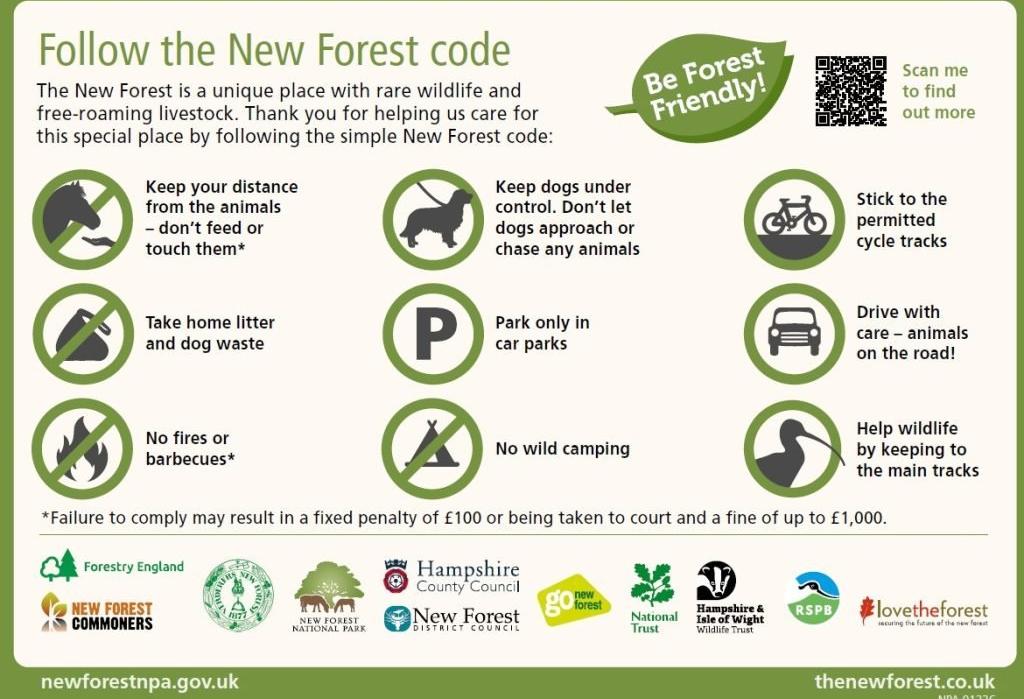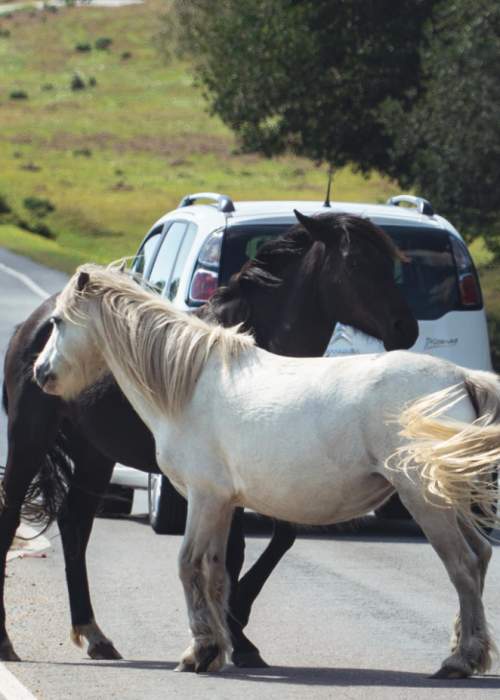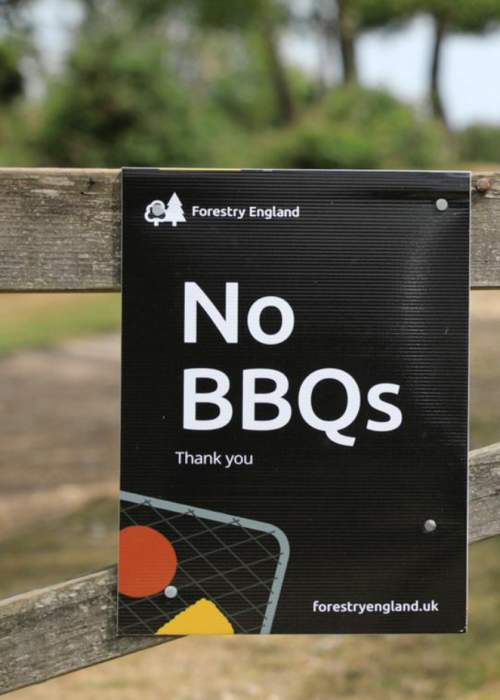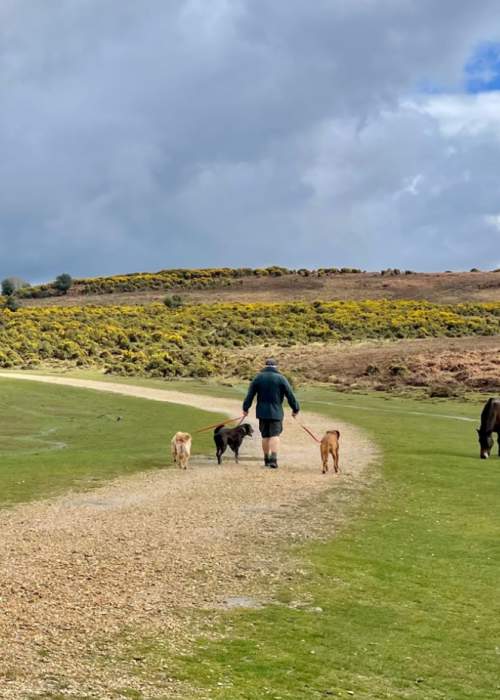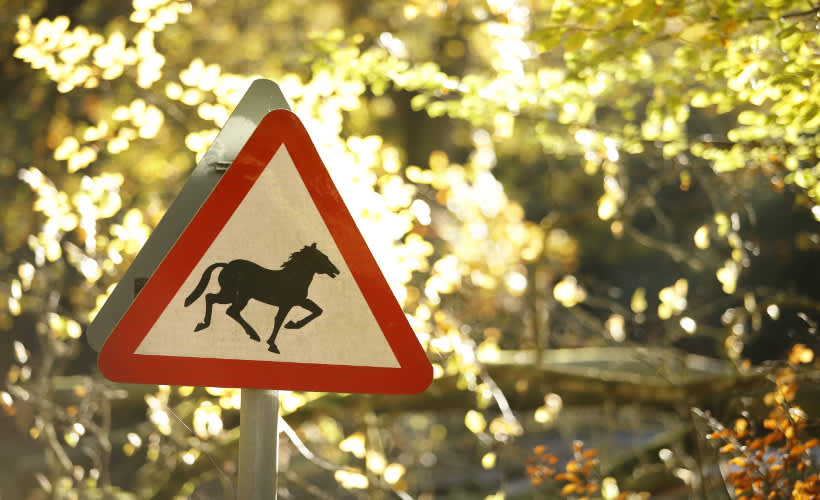Caring for the Forest
Care for the forest, care for each other - Help us in protecting and taking care of our beautiful, unique wildlife and nature in the New Forest by following the New Forest Code. Just a few simple steps that make all the difference!
The New Forest is a great place to visit for walking, dog walking, cycling and horse riding for everyone. When you’re out in the forest and are enjoying the beautiful surroundings and the rich wildlife, please help us to care for this very special place.
Ponies, donkeys, cattle, pigs & sheep: For their safety and your own please keep your distance from grazing animals, especially mothers and their young. Although owned and cared for by local people called commoners, they are unpredictable and best treated as wild. Please don’t feed or touch them; there is plenty of natural food and it’s best that they don’t come to rely on people’s attention. They may look friendly but they can bite and kick, especially ponies with foals.
Dogs: To minimise disturbance to wildlife, livestock and other people, please keep your dogs under close control - if necessary use a lead. Do not let dogs approach or chase any animals. Pick up after your dog, especially around car parks, on paths and where people play or picnic, and take bagged waste home if there is no litter bin. Help promote and practice responsible dog ownership and walking in the New Forest by taking a look at and joining the New Forest Dog Owners Group, who have come up with a brilliant Dog Walking Code for both residents and visitors of the New Forest to follow, to ensure the safety of dogs, dog walkers and the special wildlife in the New Forest.
Birds: To help ground-nesting birds rear their young safely, keep yourself, dogs and horses on the main tracks from the beginning of March to the end of July.
Litter: Your food and litter could harm our animals. Please take your litter home if bins are full.
Driving: The ponies and other animals have no road sense and frequently stand or walk on the unfenced roads, so give them (and walkers, cyclists and horse-riders) a wide berth and be especially careful when driving at night.
Parking: To avoid damage and obstruction, please park only in designated car parks, not on a verge or in gateways. Lock your car, taking any valuables with you and leave Forestry England car parks by dusk. Parking on verges is unauthorised and it is a criminal offence to knowingly damage these habitats.
Barbeques & fires: To reduce the risk of damaging wildfires, no fires or barbeques are allowed in the New Forest.
Fungi: Please leave fungi for other people to enjoy. Fungi are essential to the New Forest’s internationally protected ecosystem. Foray leaders must apply for permission for educational excursions from the Forestry England in advance. If you suspect or see commercial picking please call the Forestry England on 0300 067 4600 or the National Trust on 01425 650035.
Cycling: Cycling is allowed only on the waymarked tracks and other designated routes. When approaching people and animals, call out a warning to make yourself noticed and pass slowly and wide. Try to leave gaps for overtaking vehicles and never ride more than two abreast. Keep to a safe speed, wear bright colours to be visible and always use lights in the dark.
Horse riding: Horse riders have open access to the New Forest, but to reduce damage to the ground please use tracks when it’s wet.
Camping in the New Forest: Please note that camping in the wild and overnight parking is not allowed. There are lots of campsites in the New Forest.
Ticks: Check your dog and yourself for ticks when you get back home – they can lead to Lyme Disease. Ticks tend to live in places with damp vegetation and lots of small animals and birds (that they can feed on). Just be smart and aware when you are out and about in the forest, keep your arms and legs covered when walking in woodland and similar places, check for ticks regularly when you are out and afterwards and you can even use insect repellents containing chemicals called DEET or Picaridine. If you find a tick attached, remove it quickly and in the proper way (with a tick remover - do not try to pull it out with your fingers, burn it, scrape it off, or cut it out - you need to ensure that you remove the whole tick).
Forest management: Stay safe by taking note of warning signs and keeping away from work sites and vehicles.
Unidentified objects: Areas of the New Forest were used to test bombs in World War I and II. Please keep away from objects that might be dangerous and notify the police immediately on 999.
Buy Local: If you like fresh, locally distinctive free range and organic produce then look out for local produce. You will be helping to support small and unique forest businesses, reducing food miles and be enjoying the best locally produced food and drink around. Visit New Forest Producers Markets for food, drink and crafts and take home a flavour of the New Forest.
Give your car a break: 100 miles of off-road cycle tracks, great walks, and good public transport services, means you don't need to bring your car at all. Numerous New Forest businesses are also offering discounts and incentives for leaving your car at home, so get out there! Have fun, get fit and give your car a break. Please keep to the tracks when cycling on the open forest.
New Forest Animal Emergency Hotlines: If you find yourself in an unforeseen circumstance where you need to report an accident/injured animal please use the contacts below:
-
Police (24hrs) Tel: 999 (emergency)
Tel: 101 (non-emergency)
Road traffic accident involving a pony, cow, donkey, pig, sheep, dog or deer -
Verderer's Office (Mon-Fri 9am to 5pm) Tel: 023 8028 2052
Sick, injured, distressed or dead pony, cow, donkey, pig or sheep -
Forestry England (24hrs) Tel: 0300 067 4600
Sick, injured, distressed or dead pony, cow, donkey, pig, sheep or deer
